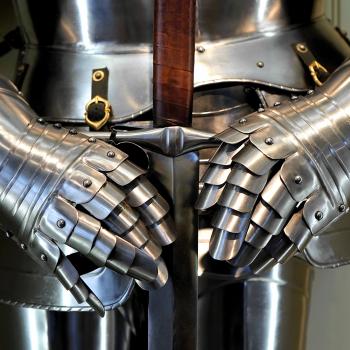To Train Up A Child, chapter 17
This chapter of Michael Pearl’s child abuse manual is titled “Religious Whips,” and I find myself once again agreeing with some of what Michael writes. It’s a weird sensation.
HATERS OF GOD
I have cringed while watching a proud parent use God for a rod of discipline. A child has been “bad,” and the mother warns, “You shouldn’t do that, God doesn’t like it.” Or, “God is going to get you for that.” Again, “Mama might not see it but God does.” Talking about negative, counter-productive training! The product of this “discipline” will be a God hater whose fear of God will be despising. Never, I say, “NEVER use God to threaten or intimidate your child into compliance.” If you constrain him through divine threats, he will throw off religion at the earliest possible date. I have seen Christian parents whose children become rebellious and bitter against religion for this very reason.
Quick note, this is a common scare tactic Micahel uses. He informs parents that if they don’t follow his methods to the letter, their children will leave the faith, and they will be the reason why. Um, no. Parenting is not a formula, and you can’t boil it down to one.
The principle is one of conditioning through association. When two things, though unrelated, occur at the same time, they merge in the subconscious. When the consciousness calls up one, the other is attached to it.
A teenage girl on a remote Mississippi farm, lonely for companionship, would lie in her bed listening to the distant train whistles while feeling isolated and sorry for herself. Years later when she was far away, happily married with several lovely children, and she heard a train whistle, a lonely melancholy feeling would come over her. It could totally change her mood, and she didn’t know why.
This idea is true, but I call bullshit on Michael’s example about the woman from Tennessee. How could Michael know the reason for this association when even she didn’t?
When I was a young teenager at summer camp, there were several boys who were rowdy late at night. The directors, after becoming frustrated and then irate, disciplined them by making them sit and read the Bible. About 2 AM, I got up to “ease myself abroad (Deut. 23:13)” and saw them sitting there with open Bibles in their laps, wearing surly expressions. At that young age, yet loving the Scripture myself, and while knowing nothing of psychology, I distinctly was grieved for what I knew was going to be the result of this “discipline.” The staff was conditioning these young men to hate the Bible. With a burning resentment in their hearts, every time they looked down at its pages they were filing away together the open Bible and a bitter spirit. Three or four hours of this could leave an aversion for Scripture that, with further reinforcement, could continue throughout the rest of their lives.
I know a mother who makes her children look up Bible verses for punishment. The exercise itself could be good training-except when it occurs as a way of dealing with rebellion. The rebellion should be resolved by the rod and correction.
When I was a child, we were sometimes punished by being sent to our beds with nothing but a Bible to read, and other times we were punished by being made to write out fifty times a Bible verse that addressed what we had done wrong. I understand Michael’s concern that such punishments could make a child resent the Bible, and I’m no fan of either punishment. I feel bound to point out, though, that being punished in this way did not make me resent or dislike the Bible.
As a child and as a teen, I loved the Bible. I recently found a diary I wrote in sporadically from when I was seven until I was nine, and every few pages I wrote out a Bible verse I liked. No one made me do that. At AWANA Bible Club, I always memorized more Bible verses than any other student there. This wasn’t required. I honestly loved the Bible.
I am no longer religious, but not because I was sometimes made to read the Bible as a punishment. My concern here is not that these punishments should be used but rather that pat claims like those outlined above will lead parents whose children leave the faith to find equally pat reasons to explain their apostasy. Yes, my parents played some role in my journey away from the church, but not through things like this (and they were not the sole drivers of my journey).
Also, for the record? I was always glad when, rather than being spanked, I was sent to my bed with the Bible or made to write out verses. It was preferable to the intense physical pain and humiliation that came with being paddled. And no, it didn’t make me take my transgressions less seriously. It’s not like I liked sitting alone on my bed or having my hand cramp up writing.
Michael goes on:
GOOD MEMORIES ARE WELCOMED
Don’t use your Devotional time as a clearing house for settling grievances. The family worship time should never be a time to “call someone on the carpet.” No one has good feelings about being called to the Principal’s office. The school Principal did the really serious paddling when I was in school. I have lived nearly a half century and still feel apprehensive going into the office at a public school. He and I had a couple of serious encounters. One of these days I am going to make an effigy of a school principal and then tell him to bend over and grab his ankles.
On the other hand, when I see pastel chalk, I remember old Mrs. Johnson, my art teacher, smiling and setting up a still-life for us to draw. I would go back there and spend hours, if I could.
What in the hell.
He advises spanking infants, for god’s sake.
I am totally with Michael on not using family devotional time to shame children. Amen and absolutely. (Of course, I go a step further and tend to look down on shaming children altogether.) It’s Michael’s lack of perspective, his inability to see that he advises parents to become what his principal was, that is baffling to me.
A psychologist would have a field day with Michael. Is his insistence on beating children to show them who is bigger and stronger, for instance, related to the trauma and violence he experienced at the hands of his principal? I’m not even going to try to answer that, but there is a serious disconnect going on here. Michael writes about “old Mrs. Johnson” and how welcome and encouraged she made him feel. On some level he recognizes that honey attracts more flies than vinegar—so why does he tell parents they must beat their children into submission? I am at a loss.
Michael would probably point out that he does say parents should have fun with their children, and that parents should smile at their children and make their home life inviting. His method seems to work like this: first, beat your children to show them who is bigger and stronger, and then, when they demonstrate absolute obedience and complete submission to parental dictate, reward them with fun activities and family adventures. Michael’s supporters point to all of his articles about having fun with your kids as evidence that he isn’t monster he’s made out to be—but this fun only comes after a child is completely defeated.
At this point I think we need to talk about Lydia Schatz. She was beaten over the course of six hours and ultimately died of liver failure when her muscle tissue broke down and clogged her liver. Michael claimed this wasn’t something he would ever advise, but he does advise continuing the spanking (with in implement, not the hand) until the child is completely submissive, and Lydia wasn’t. Lydia held out. Lydia refused to be broken.
How Michael can have such terrible memories of his childhood principal and simultaneously advise parents to whip their children until they are completely broken—his word, not mine—is beyond me.
Okay, let’s go on:
What memories and associations are you filing away in your child’s subconscious? Teach the Bible in your home. Give them exercises of looking up verses on patience, love, faithfulness and so forth; but don’t do it as a response to their failure in some area. If they should have a weakness which needs instruction, wait until the pressure and condemnation is off before giving them a study that involves their weakness. If there are guilt feelings present, the lesson will only bring further condemnation and isolation that the rod cannot absolve.
What the what what now. That middle sentence, that if a child has a weakness they need to work on you should wait until “the pressure and condemnation” are off before talking that through with them, that sentence sounded completely reasonable. Because that’s what I do. Kids don’t listen all that well when you’re accusing them of something and they’re defending themselves and everyone is angry. And yet, that’s when Michael advises using the rod.
About half the time my parents would spank me, I was sure I was right. If they would only listen and let me explain myself, they’d see that I’d done nothing wrong. Now, I don’t know that I always was right. But spanking me when I was sure I was in the right only created resentment. My solution with my own children is generally to resolve the immediate situation and then wait until tensions die down, and then bring up this or that issue with this child or the other, talking through my point of view, hearing theirs, and collaborating to create better patterns for the future.
I’m honestly not sure how Michael can admit that weaknesses that need work should be discussed when tempers aren’t high but also suggest that parents hit children in order to inflict pain when tensions are high.
When the instruction about God is separate from your discipline, they are free to make an association without feeling watched and graded. Otherwise, you will end up with children working for God’s approval, as well as yours. Allow the Spirit of God to apply truths to your child’s consciousness. The adult’s sense of discernment is more highly developed. Don’t cause them to have a foreboding of God before they are mature enough to see everything in perspective.
I mean, yes and no? Michael, remember, believes that the unsaved await literal torture in hell after death. A person can end up with a foreboding view of God without it being attached to parental discipline practices. Michael also teaches that children need to learn to submit to their parents or they will never learn to submit to God, so even he connects the two. I also don’t know how you can rely on all those verses in the Bible about applying the rod, and then suggest that you can somehow separate corporal punishment from instruction about God.
That said, I don’t think infusing discipline with talk about God punishing sinners, etc., is a good thing, even in Christian families, so to the extent that Michael’s words may forestall that, it’s all to the good.
Overall, Michael’s argument appears to be that parents shouldn’t use family devotionals to shame their children and that parents shouldn’t use the Bible as a punishment. I’m not going to disagree. Still, Michael continues to engage in the same formula parenting he promotes throughout his book, and his offhand comment about wanting to enact violence against the principle who paddled him as a child suggests that he has some issues he probably should have worked through before positioning himself as a parenting expert and marketing his formulas to fundamentalist homeschoolers.
I have a Patreon! Please support my writing!















